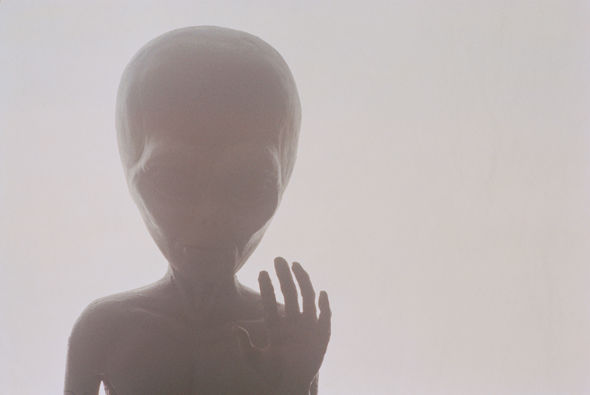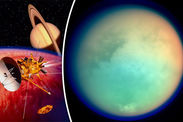MAJOR BREAKTHROUGH: Nearby planet Wolf 1061c could be home to ALIEN LIFE, say researchers
PUBLISHED: 16:33, Fri, Jan 20, 2017 |

Wolf 1061c sits in its host star’s ‘habitable zone’ – massively increasing the chance of finding alien life.
The planet is relatively close by, sitting in a star system just 14 light-years away – which is “so close and that gives other opportunities to do follow-up studies to see if it does indeed have life”, San Francisco State University astronomer Stephen Kane.
Wolf 1061c orbits the star Wolf 1061 with two other planets and is in the goldilocks zone – an orbital region which is neither too hot, nor too cold to sustain life.
However, the astronomers say that it is on the edge of being too close to the star, which could mean that heat gets trapped in its atmosphere, leading to a greenhouse effect where the temperature steadily rises.
 GETTY
GETTY
Aliens could live on the exoplanet
Experts state that this is likely what happened to Venus where temperatures now reach 880 degrees Fahrenheit – way too hot to sustain life.
Speaking about Wolf 1061c, Mr Kane said: “It's close enough to the star where it's looking suspiciously like a runaway greenhouse.”
 GETTY
GETTY
Venus was once a habitable planet
13 signs of alien life
Mon, November 14, 2016
Play slideshow

Shutterstock / Leo Blanchette
1 of 13
More than 40,000 Americans have taken out insurance against being abducted by aliens.
The team also state that, unlike Earth which experiences climatic changes such as the ice age because of minor variations in its orbit, Wolf 1061c’s orbit changes rapidly which could lead to chaotic climate change.
 GETTY
GETTY
An artist's illustration of an exoplanet
Mr Kane added: "It could cause the frequency of the planet freezing over or heating up to be quite severe.”
However, the team says that this could actually counter the effects of the “runaway greenhouse” cause, essentially keeping the planet cool enough to support life.
VIEW VIDEO HERE: http://www.express.co.uk/news/science/756859/alien-life-exoplanet-wolf-1061c-san-francisco-state-university
Thanks to: http://www.express.co.uk
and: http://www.ascensionwithearth.com/
ASTRONOMERS are studying a nearby exoplanet which they believe could be the key to finding alien life elsewhere in the universe.
By [url=http://www.express.co.uk/search/?s= Sean]Sean Martin[/url]PUBLISHED: 16:33, Fri, Jan 20, 2017 |

Wolf 1061c sits in its host star’s ‘habitable zone’ – massively increasing the chance of finding alien life.
The planet is relatively close by, sitting in a star system just 14 light-years away – which is “so close and that gives other opportunities to do follow-up studies to see if it does indeed have life”, San Francisco State University astronomer Stephen Kane.
Wolf 1061c orbits the star Wolf 1061 with two other planets and is in the goldilocks zone – an orbital region which is neither too hot, nor too cold to sustain life.
However, the astronomers say that it is on the edge of being too close to the star, which could mean that heat gets trapped in its atmosphere, leading to a greenhouse effect where the temperature steadily rises.
Related articles

Is there ALIEN life in clouds of Venus? Scientists urge NASA to exp...
WATCH: Stunning video of Nasa probe landing on possible alien home ...
 GETTY
GETTYAliens could live on the exoplanet
Experts state that this is likely what happened to Venus where temperatures now reach 880 degrees Fahrenheit – way too hot to sustain life.
Speaking about Wolf 1061c, Mr Kane said: “It's close enough to the star where it's looking suspiciously like a runaway greenhouse.”
 GETTY
GETTYVenus was once a habitable planet
13 signs of alien life
Mon, November 14, 2016
Express Pictures brings you 13 mind-blowing signs that aliens exist.

Shutterstock / Leo Blanchette
1 of 13
More than 40,000 Americans have taken out insurance against being abducted by aliens.
The team also state that, unlike Earth which experiences climatic changes such as the ice age because of minor variations in its orbit, Wolf 1061c’s orbit changes rapidly which could lead to chaotic climate change.
 GETTY
GETTYAn artist's illustration of an exoplanet
Mr Kane added: "It could cause the frequency of the planet freezing over or heating up to be quite severe.”
However, the team says that this could actually counter the effects of the “runaway greenhouse” cause, essentially keeping the planet cool enough to support life.
VIEW VIDEO HERE: http://www.express.co.uk/news/science/756859/alien-life-exoplanet-wolf-1061c-san-francisco-state-university
Thanks to: http://www.express.co.uk
and: http://www.ascensionwithearth.com/






 Sat Mar 23, 2024 11:33 pm by globalturbo
Sat Mar 23, 2024 11:33 pm by globalturbo








